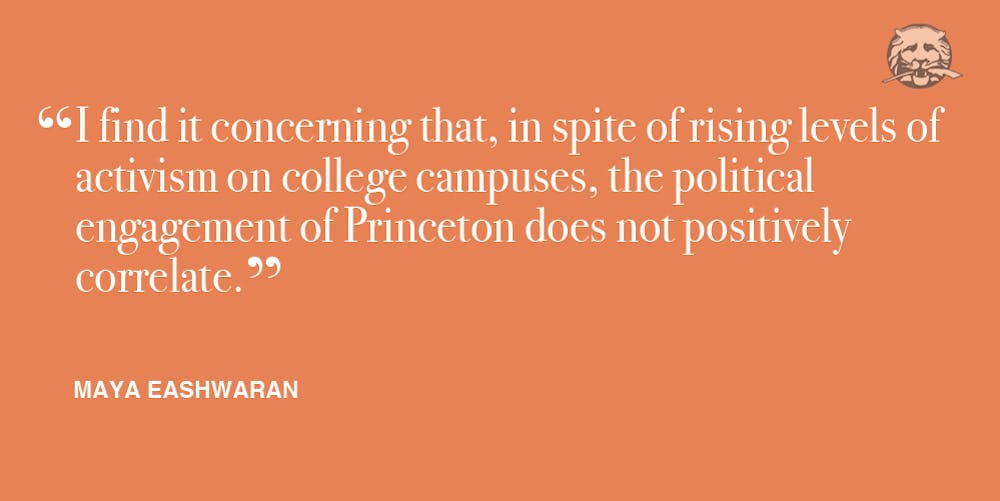On a recent sunny afternoon in Princeton, Black Lives Matter and civil rights activist DeRay Mckesson spoke at length on perception and power dynamics and their effect on race. The energy he brought was infectious — and the brutal honesty he carried in every word was equally so.
Mckesson, clad in his signature blue Patagonia vest, wields a wealth of knowledge on institutionalized racism, police accountability (or lack thereof), and policy in various states regarding incarceration and its relationship with race. As an active user of Twitter with over a million followers — one of whom is Beyoncé — Mckesson has always used social media to galvanize people into action and to educate people on the realities of race in the United States.
Power, to Mckesson, underlies systems of racism and discrimination in too many aspects of this country. He gave the example of a phone call he had with a white man in Hollywood who was confused and frustrated with Mckesson’s characterization of whiteness and how it manifests itself in everyday life. Using the example of casting sheets, Mckesson pointed to the fact that we assume that a role is a white role unless specified as “non-white” — one of the many “quiet” ways in which whiteness and power are intertwined with each other. The man on the other end of the line quieted and finally understood.
This sort of understanding is what will make a difference, and it can only come from asking ourselves tough questions. Who holds this power? What makes this sort of inequality possible? In an age in which a lack of access to information is not the answer, what are the main points that we can address to create a more just society?
These questions should be the guiding force for how we approach protest as well. Too many people are “sugar-high chasers,” Mckesson said. Especially considering college campuses, protests and undergraduates have a common history, as many movements and major changes in society have been addressed on college campuses through marches, demonstrations, and activist talks. However, protest loses some value when the high of simply being there serves as more motivation than solving the actual problem. The point of protest is tangible change. We should be marching to change a narrative, bring about legislation, or point out the many injustices in the system. The point of protest is to change the way power operates in this country.
Because of the way social media is harnessed in spreading the word about protests, there is no excuse not to know what and why we protest. Protest is not glamorous, nor should it be portrayed as such. Being aware of the issues and being politically mindful is far more important than “chasing the high,” as Mckesson puts it.
Princeton students, between classes and clubs, must find time to educate themselves on what happens outside the Orange Bubble. According to ranking lists of the “Most Politically Active College Campuses,” the only Ivy League school to make it on any of the lists is Columbia. As a point of reference, according to FiveThirtyEight, “nearly 9 percent of freshmen say there’s a ‘very good chance’ they’ll participate in a student protest on campus, the highest in the survey’s history and up from about 6 percent in 2014.”
I find it concerning that, in spite of rising levels of activism on college campuses, the political engagement of Princeton does not positively correlate. As students and as global citizens, we have a responsibility to be engaged and educated. We have a responsibility to be present in the world. Only then will our effort be legitimate and the outcomes be impactful when we protest.

Mckesson also distinguished between equity and equality. Equity, unlike equality, is not about equally portioning goods and services. To Mckesson, it is about getting people the resources they need and deserve, something that seems a logical and reasonable enough goal. Referencing President Trump’s rhetoric of “making America great again” and pulling the country back into the past, Mckesson stated that we already know that past. We already know, as a country, the horrors of white supremacy and racism. As a society, he pointed out, we see the idea of changing the system and a strong, protest-driven push toward equity as radical, simply because we haven’t been exposed to a society free of injustice yet.
Whiteness is something historically ingrained in our systems and institutions, and we can only treat these infections by starting at the grassroots level. It is as simple as being educated about why we protest and about the issues that must be addressed within our society.
The way we learn about race, the way we teach history, the way we are socialized to think about color in a specific way are all factors that contribute to the perpetuation of white privilege and therefore, power. We must consider why we march, why we make signs and chant in the streets. It’s not about us. It’s about something bigger, something systemic. It is, and it always has been, about power.
Maya Eashwaran is a first-year from Alpharetta, Ga. She can be reached at mayae@princeton.edu.









